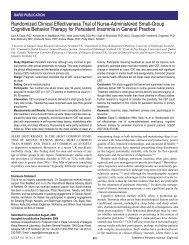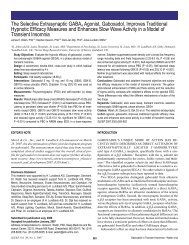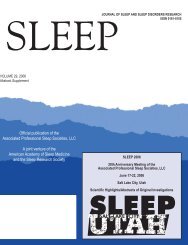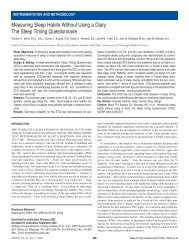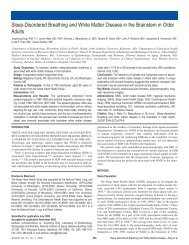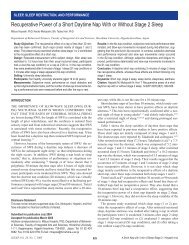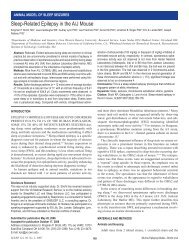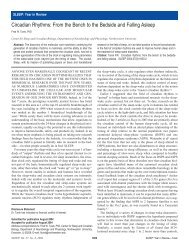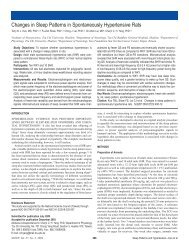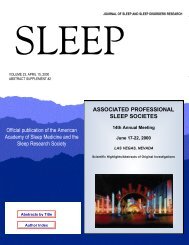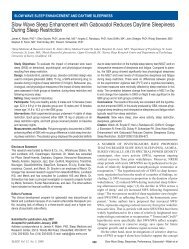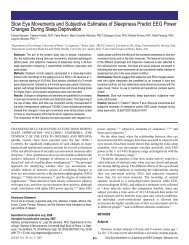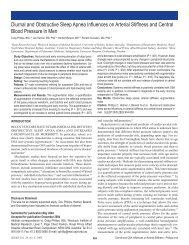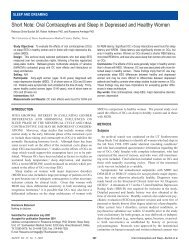- Page 1:
JOURNAL OF SLEEP AND SLEEP DISORDER
- Page 4 and 5:
EDITORIAL In June of 1986, roughly
- Page 6 and 7:
A. Basic Science I. Pharmacology an
- Page 8 and 9:
A. Basic Science I. Pharmacology an
- Page 10 and 11:
A. Basic Science I. Pharmacology an
- Page 12 and 13:
A. Basic Science II. Cell and Molec
- Page 14 and 15:
A. Basic Science II. Cell and Molec
- Page 16 and 17:
A. Basic Science II. Cell and Molec
- Page 18 and 19:
A. Basic Science II. Cell and Molec
- Page 20 and 21:
A. Basic Science II. Cell and Molec
- Page 22 and 23:
A. Basic Science II. Cell and Molec
- Page 24 and 25:
A. Basic Science II. Cell and Molec
- Page 26 and 27:
A. Basic Science III. Ontogeny/Agin
- Page 28 and 29:
A. Basic Science III. Ontogeny/Agin
- Page 30 and 31:
A. Basic Science III. Ontogeny/Agin
- Page 32 and 33:
A. Basic Science IV. Neurobiology S
- Page 34 and 35:
A. Basic Science IV. Neurobiology o
- Page 36 and 37:
A. Basic Science IV. Neurobiology
- Page 38 and 39:
A. Basic Science IV. Neurobiology h
- Page 40 and 41:
A. Basic Science IV. Neurobiology C
- Page 42 and 43:
A. Basic Science IV. Neurobiology t
- Page 44 and 45:
A. Basic Science V. Physiology 0110
- Page 46 and 47:
A. Basic Science V. Physiology comp
- Page 48 and 49:
A. Basic Science V. Physiology Resu
- Page 50 and 51:
A. Basic Science V. Physiology Intr
- Page 52 and 53:
A. Basic Science V. Physiology 0135
- Page 54 and 55:
A. Basic Science V. Physiology Conc
- Page 56 and 57:
A. Basic Science V. Physiology infl
- Page 58 and 59:
A. Basic Science VI. Chronobiology
- Page 60 and 61:
A. Basic Science VI. Chronobiology
- Page 62 and 63:
A. Basic Science VI. Chronobiology
- Page 64 and 65:
A. Basic Science VI. Chronobiology
- Page 66 and 67:
A. Basic Science VI. Chronobiology
- Page 68 and 69:
A. Basic Science VI. Chronobiology
- Page 70 and 71:
A. Basic Science VIII. Behavior 018
- Page 72 and 73:
A. Basic Science VIII. Behavior 019
- Page 74 and 75:
A. Basic Science VIII. Behavior a l
- Page 76 and 77:
A. Basic Science VIII. Behavior Res
- Page 78 and 79:
A. Basic Science IX. Learning, Memo
- Page 80 and 81:
A. Basic Science IX. Learning, Memo
- Page 82 and 83:
A. Basic Science IX. Learning, Memo
- Page 84 and 85:
A. Basic Science IX. Learning, Memo
- Page 86 and 87:
A. Basic Science IX. Learning, Memo
- Page 88 and 89:
A. Basic Science IX. Learning, Memo
- Page 90 and 91:
A. Basic Science IX. Learning, Memo
- Page 92 and 93:
A. Basic Science IX. Learning, Memo
- Page 94 and 95:
A. Basic Science X. Dreaming 0261 P
- Page 96 and 97:
A. Basic Science XI. Sleep Deprivat
- Page 98 and 99:
A. Basic Science XI. Sleep Deprivat
- Page 100 and 101:
A. Basic Science XI. Sleep Deprivat
- Page 102 and 103:
A. Basic Science XI. Sleep Deprivat
- Page 104 and 105:
A. Basic Science XI. Sleep Deprivat
- Page 106 and 107:
A. Basic Science XI. Sleep Deprivat
- Page 108 and 109:
A. Basic Science XI. Sleep Deprivat
- Page 110 and 111:
A. Basic Science XI. Sleep Deprivat
- Page 112 and 113:
A. Basic Science XII. Instrumentati
- Page 114 and 115:
A. Basic Science XII. Instrumentati
- Page 116 and 117:
A. Basic Science XII. Instrumentati
- Page 118 and 119:
B. Clinical Sleep Science I. Sleep
- Page 120 and 121:
B. Clinical Sleep Science I. Sleep
- Page 122 and 123:
B. Clinical Sleep Science I. Sleep
- Page 124 and 125:
B. Clinical Sleep Science I. Sleep
- Page 126 and 127:
B. Clinical Sleep Science I. Sleep
- Page 128 and 129:
B. Clinical Sleep Science I. Sleep
- Page 130 and 131:
B. Clinical Sleep Science I. Sleep
- Page 132 and 133: B. Clinical Sleep Science I. Sleep
- Page 134 and 135: B. Clinical Sleep Science I. Sleep
- Page 136 and 137: B. Clinical Sleep Science I. Sleep
- Page 138 and 139: B. Clinical Sleep Science I. Sleep
- Page 140 and 141: B. Clinical Sleep Science I. Sleep
- Page 142 and 143: B. Clinical Sleep Science I. Sleep
- Page 144 and 145: B. Clinical Sleep Science I. Sleep
- Page 146 and 147: B. Clinical Sleep Science I. Sleep
- Page 148 and 149: B. Clinical Sleep Science I. Sleep
- Page 150 and 151: B. Clinical Sleep Science I. Sleep
- Page 152 and 153: B. Clinical Sleep Science I. Sleep
- Page 154 and 155: B. Clinical Sleep Science I. Sleep
- Page 156 and 157: B. Clinical Sleep Science I. Sleep
- Page 158 and 159: B. Clinical Sleep Science I. Sleep
- Page 160 and 161: B. Clinical Sleep Science I. Sleep
- Page 162 and 163: B. Clinical Sleep Science I. Sleep
- Page 164 and 165: B. Clinical Sleep Science II. Sleep
- Page 166 and 167: B. Clinical Sleep Science II. Sleep
- Page 168 and 169: B. Clinical Sleep Science II. Sleep
- Page 170 and 171: B. Clinical Sleep Science II. Sleep
- Page 172 and 173: B. Clinical Sleep Science III. Slee
- Page 174 and 175: B. Clinical Sleep Science III. Slee
- Page 176 and 177: B. Clinical Sleep Science III. Slee
- Page 178 and 179: B. Clinical Sleep Science III. Slee
- Page 180 and 181: B. Clinical Sleep Science III. Slee
- Page 184 and 185: B. Clinical Sleep Science III. Slee
- Page 186 and 187: B. Clinical Sleep Science III. Slee
- Page 188 and 189: B. Clinical Sleep Science III. Slee
- Page 190 and 191: B. Clinical Sleep Science III. Slee
- Page 192 and 193: B. Clinical Sleep Science III. Slee
- Page 194 and 195: B. Clinical Sleep Science III. Slee
- Page 196 and 197: B. Clinical Sleep Science IV. Sleep
- Page 198 and 199: B. Clinical Sleep Science IV. Sleep
- Page 200 and 201: B. Clinical Sleep Science IV. Sleep
- Page 202 and 203: B. Clinical Sleep Science V. Sleep
- Page 204 and 205: B. Clinical Sleep Science V. Sleep
- Page 206 and 207: B. Clinical Sleep Science V. Sleep
- Page 208 and 209: B. Clinical Sleep Science V. Sleep
- Page 210 and 211: B. Clinical Sleep Science VI. Sleep
- Page 212 and 213: B. Clinical Sleep Science VI. Sleep
- Page 214 and 215: B. Clinical Sleep Science VI. Sleep
- Page 216 and 217: B. Clinical Sleep Science VI. Sleep
- Page 218 and 219: B. Clinical Sleep Science VII. Neur
- Page 220 and 221: B. Clinical Sleep Science VII. Neur
- Page 222 and 223: B. Clinical Sleep Science VII. Neur
- Page 224 and 225: B. Clinical Sleep Science VIII. Med
- Page 226 and 227: B. Clinical Sleep Science VIII. Med
- Page 228 and 229: B. Clinical Sleep Science VIII. Med
- Page 230 and 231: B. Clinical Sleep Science VIII. Med
- Page 232 and 233:
B. Clinical Sleep Science VIII. Med
- Page 234 and 235:
B. Clinical Sleep Science VIII. Med
- Page 236 and 237:
B. Clinical Sleep Science VIII. Med
- Page 238 and 239:
B. Clinical Sleep Science VIII. Med
- Page 240 and 241:
B. Clinical Sleep Science VIII. Med
- Page 242 and 243:
B. Clinical Sleep Science VIII. Med
- Page 244 and 245:
B. Clinical Sleep Science IX. Psych
- Page 246 and 247:
B. Clinical Sleep Science IX. Psych
- Page 248 and 249:
B. Clinical Sleep Science IX. Psych
- Page 250 and 251:
B. Clinical Sleep Science IX. Psych
- Page 252 and 253:
B. Clinical Sleep Science IX. Psych
- Page 254 and 255:
B. Clinical Sleep Science IX. Psych
- Page 256 and 257:
B. Clinical Sleep Science IX. Psych
- Page 258 and 259:
B. Clinical Sleep Science IX. Psych
- Page 260 and 261:
B. Clinical Sleep Science IX. Psych
- Page 262 and 263:
B. Clinical Sleep Science X. Normal
- Page 264 and 265:
B. Clinical Sleep Science X. Normal
- Page 266 and 267:
B. Clinical Sleep Science X. Normal
- Page 268 and 269:
B. Clinical Sleep Science X. Normal
- Page 270 and 271:
B. Clinical Sleep Science XI. Pedia
- Page 272 and 273:
B. Clinical Sleep Science XI. Pedia
- Page 274 and 275:
B. Clinical Sleep Science XI. Pedia
- Page 276 and 277:
B. Clinical Sleep Science XI. Pedia
- Page 278 and 279:
B. Clinical Sleep Science XI. Pedia
- Page 280 and 281:
B. Clinical Sleep Science XI. Pedia
- Page 282 and 283:
B. Clinical Sleep Science XI. Pedia
- Page 284 and 285:
B. Clinical Sleep Science XI. Pedia
- Page 286 and 287:
B. Clinical Sleep Science XI. Pedia
- Page 288 and 289:
B. Clinical Sleep Science XI. Pedia
- Page 290 and 291:
B. Clinical Sleep Science XI. Pedia
- Page 292 and 293:
B. Clinical Sleep Science XI. Pedia
- Page 294 and 295:
B. Clinical Sleep Science XI. Pedia
- Page 296 and 297:
B. Clinical Sleep Science XI. Pedia
- Page 298 and 299:
B. Clinical Sleep Science XI. Pedia
- Page 300 and 301:
B. Clinical Sleep Science XI. Pedia
- Page 302 and 303:
B. Clinical Sleep Science XI. Pedia
- Page 304 and 305:
B. Clinical Sleep Science XII. Slee
- Page 306 and 307:
B. Clinical Sleep Science XII. Slee
- Page 308 and 309:
B. Clinical Sleep Science XII. Slee
- Page 310 and 311:
B. Clinical Sleep Science XIII. Sle
- Page 312 and 313:
B. Clinical Sleep Science XIII. Sle
- Page 314 and 315:
B. Clinical Sleep Science XIII. Sle
- Page 316 and 317:
B. Clinical Sleep Science XIII. Sle
- Page 318 and 319:
B. Clinical Sleep Science XIII. Sle
- Page 320 and 321:
B. Clinical Sleep Science XIII. Sle
- Page 322 and 323:
B. Clinical Sleep Science XIII. Sle
- Page 324 and 325:
B. Clinical Sleep Science XIII. Sle
- Page 326 and 327:
B. Clinical Sleep Science XIV. Inst
- Page 328 and 329:
B. Clinical Sleep Science XIV. Inst
- Page 330 and 331:
B. Clinical Sleep Science XIV. Inst
- Page 332 and 333:
B. Clinical Sleep Science XIV. Inst
- Page 334 and 335:
B. Clinical Sleep Science XIV. Inst
- Page 336 and 337:
B. Clinical Sleep Science XV. Healt
- Page 338 and 339:
B. Clinical Sleep Science XV. Healt
- Page 340 and 341:
B. Clinical Sleep Science XV. Healt
- Page 342 and 343:
B. Clinical Sleep Science XV. Healt
- Page 344 and 345:
B. Clinical Sleep Science XV. Healt
- Page 346 and 347:
j u m p t o : A - B - C - D - E - F
- Page 348 and 349:
j u m p t o : A - B - C - D - E - F
- Page 350 and 351:
j u m p t o : A - B - C - D - E - F
- Page 352 and 353:
j u m p t o : A - B - C - D - E - F
- Page 354 and 355:
j u m p t o : A - B - C - D - E - F
- Page 356 and 357:
j u m p t o : A - B - C - D - E - F
- Page 358 and 359:
j u m p t o : A - B - C - D - E - F
- Page 360 and 361:
j u m p t o : A - B - C - D - E - F
- Page 362 and 363:
j u m p t o : A - B - C - D - E - F
- Page 364 and 365:
j u m p t o : A - B - C - D - E - F
- Page 366 and 367:
j u m p t o : A - B - C - D - E - F
- Page 368 and 369:
j u m p t o : A - B - C - D - E - F
- Page 370 and 371:
j u m p t o : 2 - A - B - C - D - E
- Page 372 and 373:
j u m p t o : 2 - A - B - C - D - E
- Page 374 and 375:
j u m p t o : 2 - A - B - C - D - E
- Page 376 and 377:
j u m p t o : 2 - A - B - C - D - E
- Page 378 and 379:
j u m p t o : 2 - A - B - C - D - E
- Page 380 and 381:
j u m p t o : 2 - A - B - C - D - E



